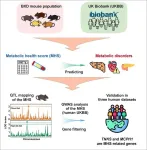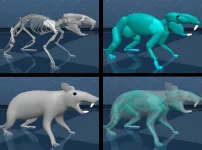Building a blueprint of metabolic health – from mouse to human
2024-06-11
(Press-News.org)
Metabolic syndrome (MetS) is a health condition characterized by a group of risk factors: high blood pressure, high blood sugar, unhealthy cholesterol levels, and abdominal fat. These factors increase the risk of heart disease, type 2 diabetes, and other serious health problems.
Previous studies have shown that both genetics and lifestyle influence MetS. But human studies have found it challenging to pinpointing the disease’s exact genetic factors and how they interact with our environment – the differences between people’s diets and lifestyles have proven impossible to control.
Now, scientists led by Johan Auwerx at EPFL have addressed the problem by developing a metabolic health score (MHS) based on clinical parameters using a type of mice called “BXD” as genetic reference population. These mice are genetically diverse, much like humans, making them perfect for studying how genetics influence health. Having developed the MHS, they used it to explore its genetic underpinnings in the mice, validating their findings in human data from the UK Biobank. The study is published in Cell Systems.
The researchers fed 49 different strains of the BXD mice either a standard diet or a high-fat diet from the age of 8 weeks to 29 weeks. Then they measured five key health indicators: body fat percentage, fasting blood sugar, triglycerides, total cholesterol, and fasting insulin levels. From these measurements, they created a metabolic health score (MHS), where a higher score indicates better metabolic health.
Next, they used advanced genetic mapping techniques (quantitative trait locus mapping) to find specific areas in the mice’s DNA that were associated with the MHS. Additionally, they analyzed liver gene expression and plasma lipid profiles to uncover molecular signatures linked to MHS. Finally, they looked at gene activity in the mouse livers and analyzed their blood to see how their metabolism was working on a molecular level.
The study also revealed two significant genetic regions on chromosomes 7 and 8 that were linked to metabolic health in a diet-dependent manner. These findings were consistent even when tested in different groups of mice, reinforcing the genetic influence on metabolic health. The study pinpointed two candidate genes, TNKS and MCPH1, which were also associated with metabolic traits in human datasets from the UK Biobank and other cohorts.
The researchers also uncovered that good metabolic health is associated with better management of cholesterol and fatty acids, as well as lower activity in certain cell stress responses and fat storage processes.
Specifically, better metabolic health (a higher MHS score) is linked to lower cholesterol and fatty acid metabolism, reduced mTORC1 signaling (mTORC1 is a protein complex that regulates cell growth and metabolism by responding to nutrients and energy levels), diminished unfolded protein response (a cell stress response that ensures proteins are properly folded and functional), and adipogenesis (making fat cells) in the liver.
The findings highlight potential pathways that could be targeted for therapeutic interventions, and underscore the importance of genetics in metabolic health. The study provides a robust model for studying gene-environment interactions, while the identification of TNKS and MCPH1 as key regulators offers new avenues for understanding and potentially mitigating metabolic diseases.
By translating these findings from mice to humans, the study paves the way for personalized approaches to managing and preventing MetS.
END
ELSE PRESS RELEASES FROM THIS DATE:
2024-06-11
WhatsApp can be a highly effective tool to help older people overcome loneliness and depression, according to the findings of a study conducted in Guarulhos, the second-largest city in São Paulo state, Brazil.
An article on the study is published in the journal Nature Medicine. The co-corresponding author is Marcia Scazufca, a scientific researcher at Hospital das Clínicas (HC), the hospital complex run by the University of São Paulo’s Medical School (FM-USP), and a professor at the school.
“This was a randomized controlled trial involving 603 participants aged more than 60 and registered ...
2024-06-11
The ocean, rich in mineral resources such as oil, natural gas, polymetallic nodules, cobalt-rich ferromanganese crusts, polymetallic sulfides, and rare earth ore, plays an increasingly important role in resource development and economic growth. It is also regarded as an essential strategic space for sustainable development with abundant wind, wave, tidal, and solar energy. Compared with onshore structures, however, offshore structures, being complex, bulky, and expensive, have to endure various random loads that change over time and space, including wind, waves, currents, tides, sea ice, and even coupled with ...
2024-06-11
When college athletes are evaluated for a possible concussion, the diagnosis is based on an athletic trainer or team physician’s assessment of three things: the player’s symptoms, physical balance and cognitive skills.
Research published today suggests that almost half of athletes who are ultimately diagnosed with a concussion will test normally on the recommended cognitive-skills test.
“If you don’t do well on the cognitive exam, it suggests you have a concussion. But many people who are concussed do fine on the exam,” said Dr. Kimberly Harmon, the study’s lead author. She is a professor of family medicine ...
2024-06-11
As long as humans have been traveling into space, astronauts have experienced significant health effects from the extreme conditions of space flight, notably the reduction of gravity.
Two Buck scientists led a team that has revealed for the first time how the lack of gravity affects the cells of the immune system at single cell resolution. As co-senior authors, along with Christopher E. Mason, PhD of Weill Cornell Medical College, Associate Professor David Furman, PhD and Associate Professor Daniel Winer, MD, published in the ...
2024-06-11
Food insecurity, low household income and not having private health insurance are associated with higher rates of prediabetes in adolescents, independent of race and ethnicity, according to a new JAMA Network Open study by University of Pittsburgh and UPMC researchers.
The findings suggest that screening for social determinants of health — the non-medical factors that influence a person's health and risk of disease — may help identify youth at risk of prediabetes, which could ultimately improve early interventions that prevent progression to type 2 diabetes.
“This study underscores the importance ...
2024-06-11
The agility with which humans and animals move is an evolutionary marvel that no robot has yet been able to closely emulate. To help probe the mystery of how brains control movement, Harvard neuroscientists have created a virtual rat with an artificial brain that can move around just like a real rodent.
Bence Ölveczky, professor in the Department of Organismic and Evolutionary Biology, led a group of researchers who collaborated with scientists at Google’s DeepMind AI lab to build a biomechanically realistic digital model of a rat. Using high-resolution data recorded from ...
2024-06-11
Scientists unlock secrets of how the third form of life makes energy.
An international scientific team has redefined our understanding of archaea, a microbial ancestor to humans from two billion years ago, by showing how they use hydrogen gas.
The findings, published today in Cell, explain how these tiny lifeforms make energy by consuming and producing hydrogen. This simple but dependable strategy has allowed them to thrive in some of Earth’s most hostile environments for billions of years.
The paper, led by Monash University Biomedicine Discovery Institute scientists, including ...
2024-06-11
The structure and function of the kidneys is altered by space flight, with galactic radiation causing permanent damage that would jeopardise any mission to Mars, according to a new study led by researchers from UCL.
The study, published in Nature Communications, is the largest analysis of kidney health in space flight to date and includes the first health dataset for commercial astronauts. It is published as part of a Nature special collection of papers on space and health.
Researchers have known that space flight causes certain health issues since the 1970s, in the ...
2024-06-11
Depressive symptoms are linked to subsequent memory decline in older people, while poorer memory is also linked to an increase in depressive symptoms later on, according to a new study led by researchers at UCL and Brighton and Sussex Medical School.
The study, published in JAMA Network Open, looked at 16 years of longitudinal data from 8,268 adults in England with an average age of 64.
The researchers concluded that depression and memory were closely interrelated, with both seeming to affect each other.
Senior author Dr Dorina Cadar, of the UCL Department of Behavioural Science & Health and Brighton and Sussex Medical School, said: “It is ...
2024-06-11
Quantum computers have the potential to solve complex problems in human health, drug discovery, and artificial intelligence millions of times faster than some of the world’s fastest supercomputers. A network of quantum computers could advance these discoveries even faster. But before that can happen, the computer industry will need a reliable way to string together billions of qubits – or quantum bits – with atomic precision.
Connecting qubits, however, has been challenging for the research community. Some methods form qubits by placing ...
LAST 30 PRESS RELEASES:
[Press-News.org] Building a blueprint of metabolic health – from mouse to human





